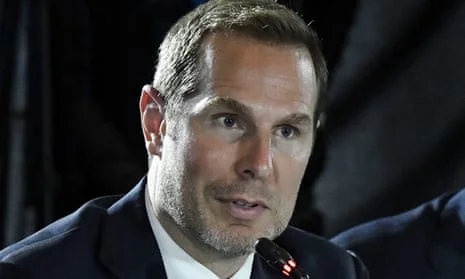
Shockwaves At State Department As Pete Marocco, Architect Of USAID Dismantling, Abruptly Departs
The State Department has been rocked by the sudden exit of Pete Marocco, the Trump-appointed official credited—and widely criticized—for masterminding the dismantling of the U.S. Agency for International Development (USAID). Marocco, who served as the director of the Office of Foreign Assistance and briefly as deputy administrator of USAID, left his post after less than three tumultuous months. His departure, shrouded in secrecy and controversy, signals a pivotal moment for the United States' foreign aid strategy and has prompted heated debate within Washington and beyond.

Marocco's rise—and swift fall—reflects the Trump administration's aggressive efforts to overhaul foreign aid. Since President Trump’s inauguration, 83% of USAID's overseas funding had been cut, devastating humanitarian programs and provoking outcry from both domestic and international observers. As recently as last week, Marocco was leading "listening sessions" at the State Department, involving nearly two dozen experts to chart the future of American foreign assistance. Yet, reports from Reuters and the Wall Street Journal confirm that Marocco’s exit was sudden and perhaps involuntary: he learned of his departure during a late-week White House meeting, during which he was asked to surrender his badge and laptop.
Behind the scenes, tensions reportedly flared between Marocco and Secretary of State Marco Rubio. Sources describe contentious debates over the extent and pace of the foreign aid cuts. While Marocco pushed for deeper and more far-reaching slashes in federal spending, Rubio sought to maintain "as many life-saving initiatives as possible." The friction culminated in Marocco’s abrupt removal, although officials publicly praised his review of foreign assistance and his exposure of what they deemed abuses in government spending.
The consequences of USAID’s virtual shutdown are far-reaching. Millions worldwide, critics say, have lost lifelines to essential aid. Democratic Senator Brian Schatz of Hawaii openly lambasted Marocco's tenure, claiming, "His actions deprived millions of people around the world of life-saving aid and jeopardized U.S. credibility with our partners. But with his exit, serious questions still remain about the influence he leaves behind."

Marocco, a U.S. Marine Corps veteran with a master’s in international humanitarian law from Oxford, had worked in prominent State and Pentagon roles throughout the Trump era. His rapid departure now leaves the Office of Foreign Assistance in the midst of a structural overhaul, with a plan due imminently to merge the remnants of USAID into the State Department’s infrastructure. This rapid policy whiplash has unsettled staff and allies alike. Trump and his allies continue to portray USAID as wasteful and corrupt without presenting evidence, while prolific cuts have forced a cycle of abrupt program cancellations, partial reversals, and further uncertainty.
As Washington weighs a future for foreign assistance with diminished resources and leadership in limbo, both supporters and critics are left wondering what vision will define America’s role abroad. Will the U.S. reclaim its mantle as a humanitarian leader, or embrace a new era of isolation and fiscal retrenchment? Share your views and join the conversation below.